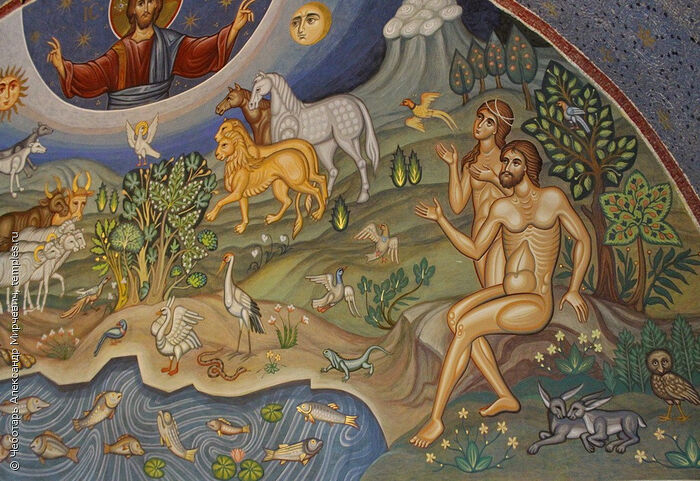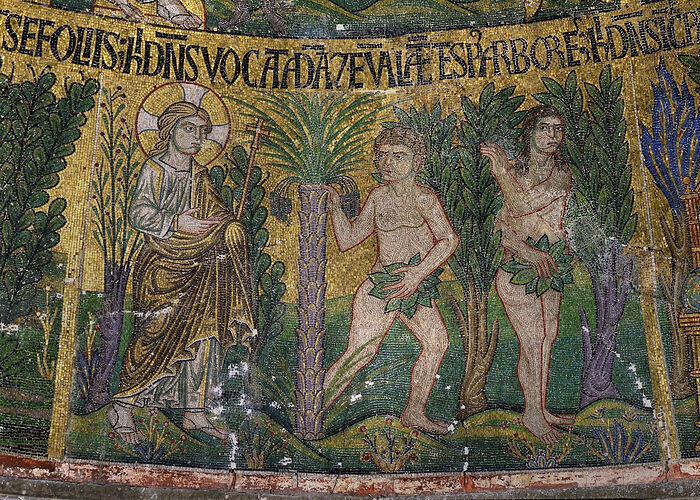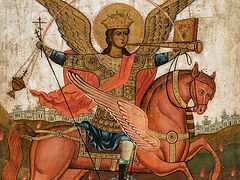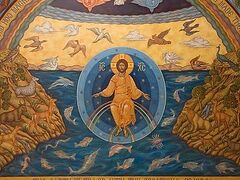How we would like to at least peek inside! To see what the souls of the redeemed are up to. Do they keep busy? Do they rest? How do they spend their time there? Is it even possible to find time in a place where eternity reigns?
We usually hear how the righteous find eternal bliss after receiving crowns for the sorrows they patiently endured and how they join the hosts of angels singing glory to God. But isn’t that too boring? Okay, they prayed, sang praises to God, sat under the canopy of the trees of paradise and enjoyed their rest from their hard labors during the earthly sojourn, and now what? We know that God shall wipe away all tears from their eyes (Rev. 21:4); i.e., He will make up for our losses, heal our wounds, and deliver us from sorrow. Now, here it is—eternal life! Our tears dried long ago, our souls are filled with peace and quiet. So, what do we do now? It is true that all men share a particular quality—a human soul can’t tolerate idleness. Then, what fills life in paradise?
The mystery of life in Heaven
Venerable Silouan the Athonite once shared a parable. An eagle was soaring high up in the skies. Observing the beauty of the world, it decided to share its observations with a rooster who lived far down below in a shabby chicken coop. When the eagle descended, the rooster was strutting around at the head of his brood and wasn’t really listening to what the eagle was trying to tell him. The rooster couldn’t understand anything from the story, since it had never even a glance of what the eagle saw from above, so he soon got tired of listening to those lofty tales. In the same way, those living on earth are unable to understand the heavenly.
Life in Paradise is a mystery for those expelled from it. The outcasts aren’t given any reason to fantasize about what life is like there. Fantasies about the spiritual usually end in tragedy.
There is a problem—every one of us has a peculiar measure of perception beyond which any further reasoning is pointless. A newborn can’t understand an adult, a blind man doesn’t understand an artist, and the deaf person won’t understand a musician. How can we explain the significance of ancient manuscripts to an illiterate man-eating savage? He will use them to light his fire to try to cook anyone who tries to explain them to him, and carry on with his savage life just as before. We can’t explain everything to everyone. Misunderstanding becomes rejection, which then becomes hostility. When people are at war with the incomprehensible, they destroy churches without the slightest idea that a church is Heaven on earth, a remnant of Paradise in our sinful world.
The Apostle Paul, who was caught up to Paradise, all the way to the third heaven, got a taste of that which is not lawful for a man to utter, (2 Cor. 12:4) or what is ineffable and indescribable. Even if he wanted to describe it, he didn’t know how. The only thing he could say in awe was that the Eye hath not seen, nor ear heard, neither have entered into the heart of man, the things which God hath prepared for them that love him (1 Cor. 2:9). It means that God has such goodness and happiness in Heaven prepared for His people that one simply cannot experience on earth.
However, the Apostle continues, But God hath revealed them unto us through His Spirit (1 Corinthians 2:10), which means that there is something we can say.
Why did God place man in Paradise?
Divine Revelation tells us that God didn’t place man in the primordial Paradise to relax under the palms and pick the fruit of the trees of Paradise. Instead, the Scriptures say:
And the Lord God took the man, and put him into the garden of Eden to dress it and to keep it (Gen. 2:15).
He put him in the Garden of Eden to work and protect it, not to sunbathe and splash about carelessly in the heavenly rivers’ cerulean waves. Therefore, man was supposed to get busy and take care of the primordial Paradise by cultivating and protecting it.
It wasn’t that Paradise needed it, as all of God’s creation was made perfectly and without blemish. Paradise was filled with the heavenly fragrance of His presence. It was man who needed cultivating. Too much rest leads to carelessness and then to idleness. We know that idleness teaches much evil (Sir. 33:28). Man, even if he was created as an innocent being, had no experience of the spiritual enrichment that comes from the intertwining of hard work, the realization of one’s God-given talents and the tenacity to overcome temptations that arise.
As such, the tree of knowledge of good and evil was there to nurture in people faithfulness to God. It meant the removal of any of the deceiver’s temptations from the land that God created. Nurturing meant an effort and labor on the part of man.
Man’s work in Paradise, and what it consisted of, remains vague and obscure. According to St. John Chrysostom, it was “painless labor, free from suffering.” It was a path of advancement towards spiritual excellence. Let’s be bold and assume that the cultivation of the Garden of Eden meant certain creative activity by man, his profound conscious and personal inclusion in the heavenly harmony of the primordial world that breathed the grace of the Holy Spirit.
It was revealed that Adam gave names to the animals (Gen. 2:19-20). To do so, one must have the ability to know and understand those whom you are about to name. A scientist discovers a new star and names it. Adam, in learning about the universe God created, gave names in an attempt to penetrate into the mystery of its creation. This process is by no means idleness, but rather a deep, creative labor of the mind and the will. Giving a name, as the expression of one’s knowledge through words, means that man was able to formulate the results of his cognitive activity.
Other jobs in primordial Paradise
It appears that there were many objectives set out before the people in primordial Paradise. We read, in particular:
And let them have dominion over the fish of the sea, and over the fowl of the air, and over the cattle, and over all the earth, and over every creeping thing that creepeth upon the earth (Gen. 1:26).
To have dominion, one must be capable of doing so and know how to manage.
The world of living creatures was neither in chaos, nor did it consist of the destruction of the weak by the strong. It was a different world, awash with the grace of the Holy Spirit. There was neither death nor predators. However, the order and harmony of creation were supported by the activity of man as the crown of God’s creation. As long as man upheld his union with God, the world, through man, was effused with the light of God’s grace.
St. Macarius the Great reveals some of the mystery to us:
“When the enemy of mankind tempted Adam and thus prevailed over him, he also bereaved him of power, having taken upon himself the name of the prince of this world. Originally, the Lord appointed man as the prince of the world and the master of the universe. Fire did not overcome him, nor did water drown him. Neither the wild nor venomous beasts could harm or have any negative effect on him. But once he succumbed to temptation, he surrendered his authority to his tempter.”
Who could ever have guessed that the title of “the prince of this world” was stolen by the devil from… man? But that is what happened. Initially, the king on earth was the one who beheld the image of the Heavenly King. God, as the Heavenly King, sealed man, the earthly king, with His image. A pious kingdom is not a willful or petty tyranny, neither is it like the yoke of a mad despot. A pious kingdom is the sacrificial care of those entrusted to you by God Himself. In the process of knowing God, man was called to continue on the path of self-perfection and, while undergoing this transformation himself, to transform the world around himself at the same time.
The royal dominion of primordial man as the crown of creation meant that he wasn’t separated from the nature that God had created. He was called to appeal to God with his mind and his heart, all the while protecting, beautifying and conserving the world that God had made, just as we keep a fire burning in the hearth when given such a task. Our carelessness results in the fire going out, which then leads to cold and even freezing.
There was another task in Paradise, by the way: to be fruitful and multiply (Gen. 1:28). A nice one, isn’t it? The corrupt mind of modern man understands it in the most primitive way. To conceive and abandon—such is the behavior of unreasonable beasts (and not even all of them!) when they leave the survival of their progeny to chance. To be fruitful and multiply, man needs to know how to take care of the one who gives birth and those she bears. Caring means love, for without love everything else loses its significance. What’s more, to multiply and to be fruitful, one should know how to nurture and give your offspring the best of yourself, and this task has been a real science for man since his days in primordial Paradise.
Admittedly, the holy fathers treated this particular objective in a lofty manner. Since the spirit ruled over the flesh, procreation of the flesh was a different matter. Here is what the Holy Hierarch St. John Chrysostom says about it:
“Before [the fall—Ed.], they lived like angels, and they did not know the pleasures of the flesh. Ah! how could they have known them, since they were not subject to the needs of the body!” 1
Holy Hierarch Ignatius (Brianchaninov) clarifies:
“Procreation was meant there to be performed in the entirety of chastity and dispassion. It was intended to be the unblemished spiritual delight instead of a carnal, beastly pleasure. We shouldn’t try to visualize the primordial procreation, if it was concealed by God, and believe that if God allowed the method known to us, He could just as easily establish a different form of procreation… In a fact that woman was taken out of man (creation of Eve from Adam), we see the example of dispassionate procreation of the human race before the fall.” 2
Practically all the holy fathers held the same opinion.
Only Blessed Augustine assumed that the method of conception in Paradise would have been identical to what we have today save for the absence of the desire for carnal pleasures. In his own words, coition would be controlled by man’s will instead of lust:
“But so long as the will retains under its authority the other members, without which the members excited by lust to resist the will cannot accomplish what they seek, chastity is preserved, and the delight of sin foregone.”3
No matter which way you look at it, Paradise wasn’t a kingdom of lust.
Such was the old Paradise. Today Paradise, where the souls of the saved go, is far above all fleshly things. The Paradise of the general Resurrection will also be without the slightest hint of passion. Therefore,
But they which shall be accounted worthy to obtain that world, and the resurrection from the dead, neither marry, nor are given in marriage: Neither can they die any more: for they are equal unto the angels; and are the children of God, being the children of the resurrection (Lk. 20:35–36).
(To be continued)





